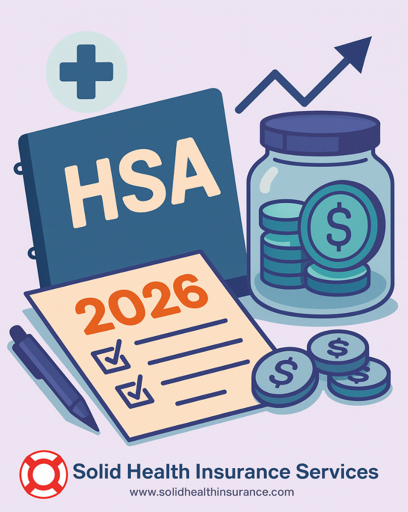
What is a Health Savings Account (HSA)?
A Health Savings Account (HSA) works much like a “medical IRA.” It’s a tax-advantaged savings account designed to help individuals with High Deductible Health Plans (HDHPs) pay for qualified medical expenses. Significant changes are coming in 2026 with the introduction of the “Big Beautiful Bill.” Expanded HSA eligibility, Direct Primary Care coverage, and permanent telehealth benefits make HSAs more accessible and flexible than ever. This summary outlines the key contribution limits, eligibility rules, and new provisions designed to help individuals and families save more effectively for healthcare.
HSAs offer three key tax advantages:
- Tax-deductible contributions: Contributions reduce your taxable income.
- Tax-free growth: The account does not tax investment gains.
- Tax-free withdrawals: Qualified medical expenses can be paid tax-free.
Since its introduction in 2004, HSAs have become a popular tool for individuals and employers to save for healthcare expenses and retirement.
2026 IRS Contribution Limits
The IRS has increased the contribution limits for 2026 to reflect inflation adjustments and the implementation of the “Big Beautiful Bill” provisions.
IRS Limits20252026ChangeHSA Contribution Limit (employer + employee)Self: $4,300Family: $8,550Self: $4,400Family: $8,750Self: +$100Family: +$200HSA Catch-Up Contribution (55+)$1,000$1,000No changeHDHP Minimum DeductibleSelf: $1,650Family: $3,300Self: $1,700Family: $3,400Self: +$50Family: +$100HDHP Out-of-Pocket Maximum (excl. premium)Self: $8,300Family: $16,600Self: $8,500Family: $17,000Self: +$200Family: +$400What’s New in 2026: “Big Beautiful Bill” Provisions
1. Expanded HSA Eligibility
Any Market exchange Bronze or Catastrophic ACA plan will now be considered HSA-eligible, giving more individuals the ability to open and fund an HSA.
2. Direct Primary Care (DPC)
You can use HSA funds for Direct Primary Care arrangements—up to $150/month for individuals or $300/month for families—without losing HSA eligibility.
3. Permanent Telehealth Coverage
Telehealth and remote care services are permanently allowed to be covered before the deductible, increasing accessibility and affordability of care.
FeatureBefore 2026Starting 2026HSA EligibilityHDHP onlyHDHP + Bronze & Catastrophic ACA plansDirect Primary CareCould disqualify HSAHSA-compatible up to indexed limitsTelehealthLimited safe harborPermanently allowedFitness ExpensesNot allowedNot allowedMedicare Part AContributions not allowedNo changeHSA – 2026
What are the requirements for having an HSA?
- You must be enrolled in a Market exchange ( Covered California) Bronze or Catastrophic plan or high deductible qualified health plan (HDHP) with any carrier
- You cannot be claimed as a dependent on another person’s’ tax return
- You cannot be enrolled in Medicare
- You cannot have dual health insurance coverage (be covered by another non HSA qualified
health plan.)
How do I fund the HSA?
You fund the HSA using federally tax-free dollars. If your employer allows, you can elect to have pre-tax contributions made via payroll deduction. You can also transfer funds online or send an “after tax” check and take the deduction as an above the line deduction on your federal income tax return 1040 when you file your taxes. Another option is to roll money over from an existing IRA.
As an individual policyholder, you would open up an HSA Account . To Find a suitable HSA Account please review this list
How can funds be used?
The funds can be used for qualified health care expenses, including medical, dental and vision. Please see www.IRS.gov section 213 (d) for a full listing of qualified expenses. HSA funds can also be used to pay for COBRA premiums, Long Term Care premiums and Medicare premiums (Part B, C and D). All funds can be spent on eligible expenses for any IRS dependent, regardless of whether or not they are covered on the health plan. If funds are used for non-qualified expenses, a 20% IRS penalty applies.
What happens when I turn 65?
You can continue to use funds in an HSA for qualified medical expenses, paying Part B, Part D or if applicable Part C premiums, and for Long-Term Care premiums tax free. Another benefit for account holders 65 and over is that the HSA funds can also be spent on non-qualified expenses without a 10% penalty. Distributions for non-qualified expenses are taxed as “ordinary income”.
Stop making contributions to your HSA account 6 months before enrolling into Medicare, or you risk tax penalties.
Do I lose the funds if they are not spent at the end of each year?
No. Unlike other health care accounts like FSA’s, there is no “use it or lose it” provision with HSA’s. The funds in an HSA roll-over from year to year, are interest bearing, and are even portable if the account holder changes jobs or health insurance carriers. HSAs are often viewed as additional retirement savings accounts for these reasons.
How do I pay for things?
Depending on the HSA bank, you can use a HSA debit card or checking book which you can use to purchase items that are qualified expenses. For example, at an in-network doctor’s office you will wait to be billed and then place your debit card numbers in the card options spot on the bill when you receive it. At the pharmacy, for dental, vision and out-of-network doctors, you will also have the option of using your debit card at the time of service.
Do I have investment options for balances in my HSA?
Yes, you have full reign to self-direct the funds in your HSA account. However, it is recommended that you leave your deductible or better yet the out-of-pocket maximum amount liquid in your HSA managed account in case of a medical emergency.
Read also this good article about free HSA accounts.
Why would i choose an HSA?
HSAs are beneficial in many ways. Not only do account holders save money on health insurance premiums, but they are better able to take control over their health care choices and expenses. HSAs are the innovative financiers of health care today and retirement tomorrow. Why spend more than you need to on premiums and taxes when you could be saving the money for yourself on a rich benefit PPO plan?
For additional information on HSA and our health insurance services, please contact us at [email protected] or call 310-696-2002.
Disclaimer: This story is auto-aggregated by a computer program and has not been created or edited by healthlydays.
Publisher: Source link











